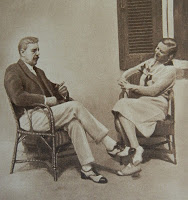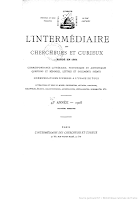We are staying here for a few weeks. The cottage is small but the landscapes and food are excellent, and I am working. Occasionally I have to go up to town. I went for a walk at 10.10 along the straight Storrington Road., and sat on stiles while thinking out my next chapter. I am making very good progress with "The Vanguard".
 Amberley is a village and civil parish in the Horsham District of West Sussex, England. It is situated at the foot of the South Downs, and is noted for its many thatched cottages. The house named "The Thatched House" is one of the village's few non-thatched houses. To the north of the village is the tidal plain of the River Arun, known as Amberley Wild Brooks. This wetland area is a Site of Special Scientific Interest which floods in winter and is known for its wildfowl. Arnold Bennett stayed in the village for eight weeks in 1926 and this stay is documented in his journals. During May–June 1926, he wrote the last two thirds of The Vanguard in 44 days, noting "I have never worked more easily than in the last six weeks." He also met John Cowper Powys who walked over the Downs to visit him. Frank Swinnerton lived in Cranleigh and had links with Bennett, subsequently selecting and editing his Journals.
Amberley is a village and civil parish in the Horsham District of West Sussex, England. It is situated at the foot of the South Downs, and is noted for its many thatched cottages. The house named "The Thatched House" is one of the village's few non-thatched houses. To the north of the village is the tidal plain of the River Arun, known as Amberley Wild Brooks. This wetland area is a Site of Special Scientific Interest which floods in winter and is known for its wildfowl. Arnold Bennett stayed in the village for eight weeks in 1926 and this stay is documented in his journals. During May–June 1926, he wrote the last two thirds of The Vanguard in 44 days, noting "I have never worked more easily than in the last six weeks." He also met John Cowper Powys who walked over the Downs to visit him. Frank Swinnerton lived in Cranleigh and had links with Bennett, subsequently selecting and editing his Journals.I was reading about Scott's methods in The Times Lit. Suppl. on Sunday, and it seems he wrote the last chapters of "Woodstock" at the rate of one chapter, or about thirty printed pages a day, consecutively. Well, it is almost miraculous. It must have been 5 or 6,000 words a day. And once written the stuff was not re-read or looked at, at all, until the proofs came in. If I could write anything like that I should only work six months in the year. I suppose it's true.
I nursed Virginia for 20 minutes, while Dorothy played a Bach-Tausig Fugue, etc. It is very interesting nursing the baby for a short time; but the narrowness of the baby's interests must make it tedious quite soon. I kept the creature very 'good'. Mother & babe are in the greatest form.
After having ascertained through her relatives & friends that my legal wife would not agree to a divorce, I wrote to her & formally asked her. She then formally refused - on the ground of her still-continuing professed affection for me! So that is that. Our relations (by correspondence) are always most amicable.






























